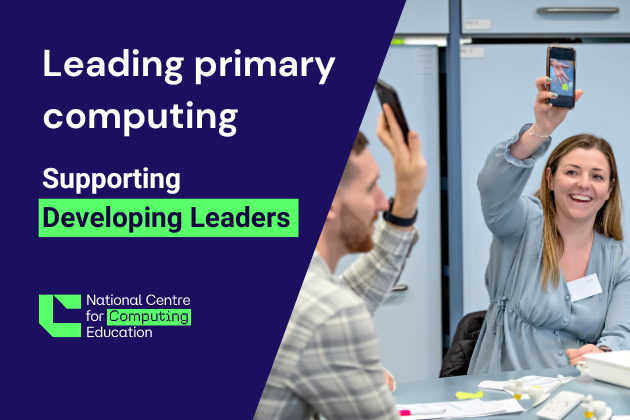Pathway to leading primary computing - supporting developing leaders
01 July 2024

So you’ve been a computing leader for a while now… You’ve managed to get computing lessons timetabled and taught regularly across your school; your teachers know what to teach and have access to all the necessary resources; you’ve got assessment happening and evidence being gathered and you’re confident in what your role as a computing subject leader entails. So what’s next? You are ready to embark on the ‘Developing Leader’ stage of the Primary Computing Leadership Journey!
By the way, if you aren’t yet confident that those things mentioned above are taking place, visit the ‘New Leader’ blog. Please also remember that each individual increment on the journey has its own blog piece - use the infographic below to navigate them.

The second section of the leadership journey, ‘Developing Leader’ aligns very well with the full day remote course: Leading Primary Computing – Module 2. As you can see, the first increment is supporting staff. While you may have provided all the necessary curriculum resources and teaching materials to your staff, they may well still be lacking in confidence and experience when it comes to teaching high quality computing lessons. In particular where a school has perhaps switched curriculum from a subscription based scheme of work or bespoke curriculum to the free Teach Computing Curriculum (TCC).
In many situations, the previous computing scheme will have been well known to the teachers, but could be out of date, or simply not up to the standard that is expected. I have witnessed some teachers being reluctant to change because it may be drawing them away from a scheme where pupils engage in learning within self-contained software. Although this can be ‘easier’ for the teacher as the learning is largely autonomous, it does not give pupils the rich and broad experience of receiving quality first teaching. Now is your opportunity to provide support and training to your staff, through free NCCE courses and also in-school CPD and workshops that you can run (learn the best ways to do this on the Module 2 course). Couple this with the session on leading change, and you are well on your way to being an effective leader for your staff.
I’ll never forget some words of wisdom form a deputy head in one of my previous schools. He said that everyone casts a shadow when they walk into a room. I’m sure you know what I’m talking about; sometimes someone will walk into your classroom and your reaction can be one of fear – "Oh no, what are they going to ask me to do this time?" Or shame – "What is it I’ve forgotten to do? Are my displays/ planning good enough?" Or a reaction of relief and peace – "Ah thank goodness they are here! I can ask them about this, they can show me this, I know they’ve got my best interests at heart". That is the kind of leader I want to be, and the kind of leaders I want you to be! So often in computing there are problems beyond the standard issues you’d get in other subjects, mainly because of the technology but also because the concepts, content and skills are constantly being updated. So, if you can provide that safe space for your staff to learn, develop, ask and inquire, then your staff will look forward to teaching computing rather than putting it off, and your subject will thrive.
Also mentioned in this section of the leadership journey is the Computing Quality Framework. This is not only a diagnostic tool for leaders, but also provides accreditation for the school once level 4 or above is achieved in each of the seven dimensions. This is an excellent tool to identify areas for development in your school’s provision, giving you the next steps to move forward. You could also apply to be part of an NCCE Computing Cluster; a group of schools in a similar position on the CQF that can access fully funded support from Computing Hubs and dedicated Advisors.
Finally, Physical Computing is featured in this section of the journey. This is a particular area of interest for me, I absolutely love the creativity, collaboration and learning that a physical computing project generates. There are many resources to support you with physical computing from the NCCE, including free kit hire from your local Computing Hub.
Now head over to the STEM community for the first blog in the Developing Leader series: ‘Supporting Staff’.
About the author:
Phil Wickins is the NCCE Subject Specialist for Primary Computing Leaders